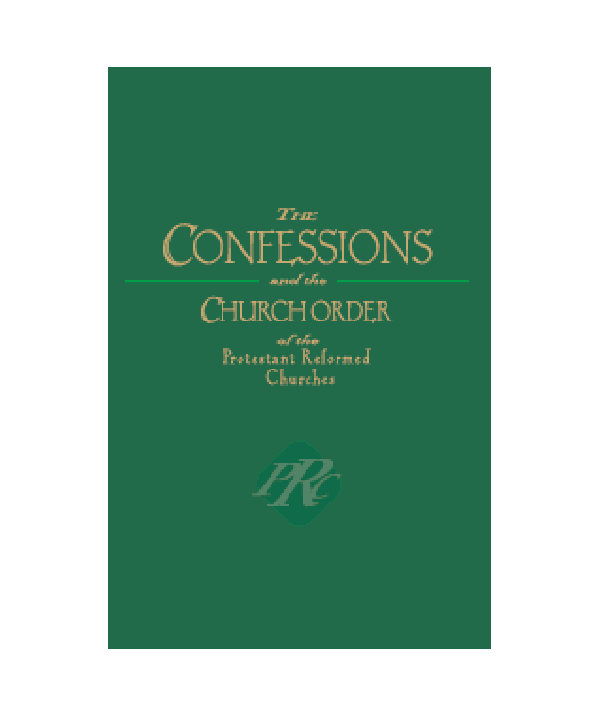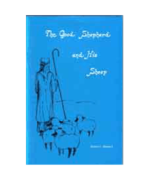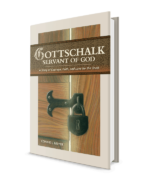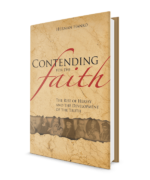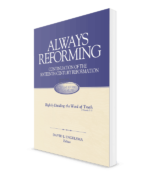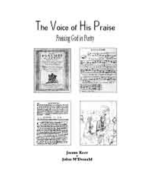This definitive, hardback book is a wonderful tool for reading and studying the Three Forms of Unity, the four main ecumenical creeds (Apostles’, Nicene, Chalcedonian, and Athanasian), the Church Order of Dordt, various Reformed Forms, and the Declaration of Principles which contains quotations from the Reformed creeds on God’s unconditional covenant with His elect in Jesus Christ. A harmony with cross references between the Belgic Confession (1561), the Heidelberg Catechism (1563) and the Canons of Dordt (1618-1619) is provided, and the Scripture proof texts to these Reformed creeds are quoted in full. This attractive work comes complete with introductions to the creeds and indices of words, doctrines, and Scripture.
This book can be read on-line in pdf file format.
To order in N. America, please contact the Protestant Reformed Seminary
“Thank you for sending me the Confessions and Church Order book. I was getting it particularly for the services, baptism and communion, but it has already been such a blessing having all the Bible references for the Heidelberg Catechism printed out. I’ve studied the first six Lord’s Days and will continue now. It is such a great help!” – Yorkshire, England
“[The Confessions & Church Order book] is a brilliant resource. Thank you!” – England
The Confessions and the Church Order of the Protestant Reformed Churches. Published by the Protestant Reformed Churches in America, 431 pp. (hardcover). [Reviewed by Prof. Russell Dykstra.]
The long anticipated study edition of the confessions and church order is off the press and now available. This is a significant and valuable book for those who love and honour the Reformed confessions, the Reformed liturgical forms, and the church order of Dordt.
The preface of the book recounts the history of its coming into existence. Back in 1995, the synod of the PRC “went on record as favouring” the concept of a study edition of the confessions. Various subsequent synods decided on the content until in 2005, the synod gave final approval.
This book gives evidence of a tremendous amount of work—good work—by the catechism committee, Mr. Fred Hanko, and still others who assisted in the formatting of the book (some of this latter work I witnessed taking place at the computer of Mrs. Don Doezema). The result of this careful work is a fine product.
The book contains the three main creeds of the Reformed churches of the Netherlands tradition—the Heidelberg Catechism, the Belgic Confession, and the Canons of Dordrecht—commonly called the Three Forms of Unity. It also includes the ancient creeds (Apostles, Nicene, Athanasian, and Chalcedon). Each of these seven creeds has its own introduction, briefly explaining the history and significance of the creed.
Also included in the book are liturgical forms largely formulated by the Reformed churches in the Netherlands (most of them in the Reformation era). The Protestant Reformed Churches still utilize these forms with only minor adaptations. Included are such forms (ten in all) as the Form for the Administration of Baptism, the Lord’s Supper form, and various ordination forms, plus two more—the document entitled “Consolation of the Sick,” and the “Formula of Subscription.”
Additionally, this study edition includes the Church Order used by the PRC (with an index), and the Declaration of Principles.
Thus this book brings together the documents found in the back of the Psalter and the “green Church Order book” used in the PRC. That combination all by itself would make it a valuable book.
However, it is the painstaking work of indexing that gives the book its major, significant value as a study edition of the creeds. The confessions have four different kinds of indices. The first is a harmony of the Three Forms, useful for determining, for instance, that the doctrine of Lord’s Day 16, Q. & A. 44 (Christ’s descent into hell) is also discussed in the Belgic Confession Article 21 and in the Canons, Head II, Articles 2-4.
The second is a doctrine index (which includes the ancient creeds and the Three Forms, as do the next two indices) divided according to the Reformed systemization of doctrine, namely, six divisions (called loci)—Theology, Anthropology, etc. Very useful.
The third index to the creeds is a rather complete (forty-five page) word index. From this one can quickly learn where in these confessions the concept “children” is discussed, or “works,” or “free will,” and many others.
The fourth index to the creeds is a Scripture index listing where in the creeds various texts are quoted, expounded, or used as proofs for particular doctrines. It could be noted that the proof texts of the three Reformed creeds are given in full in footnotes to the creeds themselves.
It is an impressive work. But there is more.
There are three indices to the liturgical forms—a doctrinal index, a word index (thirty-five pages), and a Scripture index as well.
The only document not indexed is the Declaration of Principles, probably because it is not a creed.
The one concern I have is with the Scripture references attached to the various articles of the Belgic Confession. A significant matter is whether the texts are valid as proof texts for the articles to which they are attached. That in turn depends on whether or not the Reformed church adopted these texts in the past. The Synod of Dordt adopted the Three Forms, including the Belgic Confession. However, solid evidence exists that while the Synod adopted the Heidelberg Catechism with proof texts, it deliberately adopted the Belgic Confession without Scripture references.* For this reason there is no agreed-upon body of Scripture references to the Confession. For the most part, the references in the study edition seem to be accurate. However, Psalm 33:17 (“An horse is a vain thing for safety: neither shall he deliver any by his great strength.”) is given as a reference to the truth that the Spirit proceeds from the Father, obviously an incorrect reference. There may be others. I suggest that the Catechism Book Committee study this further, at the least to clarify the status of the Scripture references in future editions.
Doubtless there will be mistakes found, typos identified, etc, but this copy has no obvious mistakes that I could find.
This hardcover study edition is a real bargain—available for cost—at $9. The binding is of excellent quality. It is also attractive.
But for all that, it is worthless unless it is used in harmony with its purpose—a study edition of the confessions. Teens, parents, grandparents, office-bearers—all of us can profit from the diligent use of it. Consistories may well want to obtain a supply of the books, for easy examination and purchase by members of their congregations. The Reformed confessions are a precious heritage, but are too often neglected. There is great personal, spiritual profit in reading and studying these documents. With publication of this study edition, access to the content of the creeds became easier. Let’s study!

